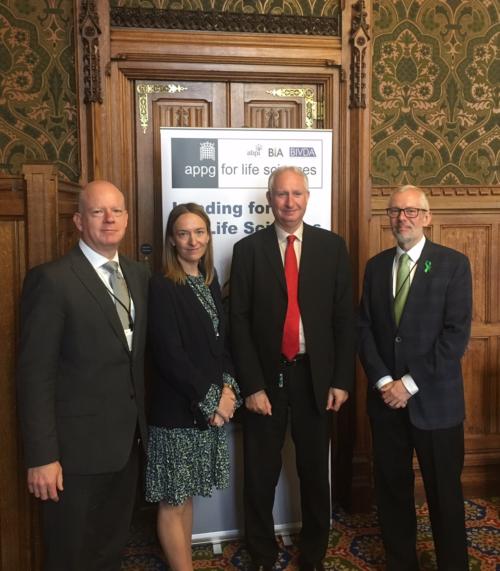Access to medicines in Parliament
Today, as the BIA brings senior representatives from across the UK’s life sciences sector to meet with parliamentarians and civil servants for our annual Parliament Day, we thought we’d take a look at another key way we engage with Parliament – the All Party-Parliamentary Group (APPG) for Life Sciences.
The APPG is a cross-party group for MPs and Peers with an interest in the sector and is chaired by Daniel Zeichner MP (Lab) and vice-chaired by Chris Green MP (Con). The APPG works to raise awareness and understanding in Parliament of the valuable contribution the life sciences sector provides to the health and wealth of the nation. The BIA provides the secretariat together with our colleagues at the ABPI and BIVDA.
In May, the APPG hosted an event in Parliament to give MPs an overview of the Voluntary Pricing and Access Scheme (VPAS) and the key challenges around access to medicines and diagnostics. This is very timely topic subject to both public and parliamentary debate – BBC Newsnight has reported on treatments for rare diseases, the Health and Social Care Committee is holding an inquiry on the availability of the cystic fibrosis drug Orkambi, and MPs have debated access to medicines in the NHS several times this year.
The event was chaired by Daniel Zeichner MP, Chair of the APPG and Labour member for Cambridge, and we had several other MPs in attendance. Paul Catchpole from ABPI started off the discussion by explaining the key elements of the VPAS. The VPAS, which replaces the old Pharmaceutical Price Regulation Scheme (PPRS), was negotiated by the Department of Health and Social Care (DHSC) and the ABPI. The scheme started at the beginning of this year and will be in place for five years. Paul explained that the scheme aims to:
- improve patient access to medicines by getting the best value and most effective medicines into use more quickly
- keep the branded medicine bill affordable for the NHS through a cap in growth of branded sales
- support innovation and a successful life sciences industry in the UK
After Paul’s overview of the VPAS, we heard from Sarah Byron from NICE, who gave her organisation’s perspective on the VPAS and access to medicines. She highlighted that NICE has committed to conducting a methods review.
One of the aims of the review will be to make the appraisal process for rare diseases clearer. NICE has established a steering group, which will help to design and guide the review. BIA has secured a spot on the group and we will nominate one of our members to take this spot shortly.

Darren Stenlake (BIVDA), Charlotte Galvin (Amicus Therapeutics), Daniel Zeichner MP and Paul Catchpole (ABPI) at the APPG event in Parliament.
After Sarah’s remarks, Darren Stenlake from BIVDA offered the perspective of the diagnostics industry. Darren argued that diagnostics are a vitally important segment of the life sciences sector and provide enormous value to healthcare – both in terms of how they can transform care but also due to cost-savings they can offer the NHS. However, the uptake of diagnostics tests in the NHS is slow and Darren highlighted that the Accelerated Access Collaborative (AAC) was already generating some early results, but that collaboration going forward will be key to capitalise on the opportunities ahead.
Charlotte Galvin from Amicus Therapeutics, a BIA member and also part of our Rare Disease Industry Group, then highlighted the specific challenges around evaluating medicines for rare and ultra-rare diseases. She emphasised that while modern science is helping to save patient lives at a pace never seen before, the system for evaluating rare diseases in the UK “is completely unfit” to the detriment of patients. Charlotte referred a recent MAP Biopharma's report, which concludes that the uptake of rare medicines is inefficient and needs to be reformed.
However, Charlotte also highlighted that there are reasons for optimism. By bringing patients, government, NHS and industry together, the NICE Methods Review is a timely opportunity facilitate a more holistic approach to the evaluation of rare disease medicines to ensure NHS patients can access the best innovations developed by the life sciences sector.
Following the remarks from the speakers, MPs and member companies in attendance discussed how policymakers and industry can work together to achieve our shared goal of securing access to medicines in the NHS and strong life sciences sector that generates economic benefits all around the UK.
In closing, Daniel Zeichner said that the UK has a world leading life sciences sector and while the wider world is constantly changing, the life sciences sector is remaining steady. Daniel also emphasised the importance for policymakers not to damage R&D in the life sciences sector and called for a continued dialogue between policymakers and sector leaders.
You can follow the APPG for Life Sciences on Twitter or contact BIA’s Policy and Public Affairs Manager Eric Johnsson at [email protected] for more info about the group’s activities.
.png)
.png)
